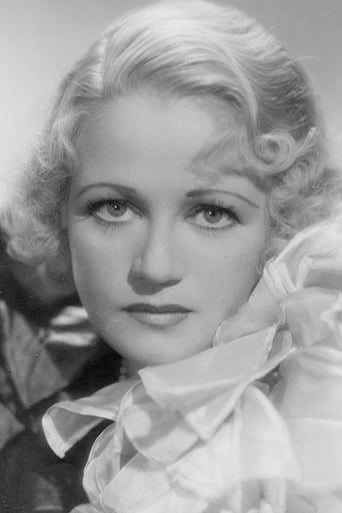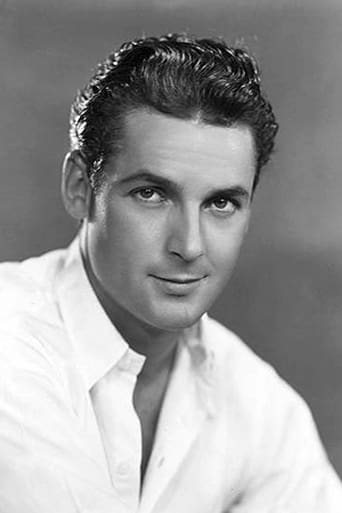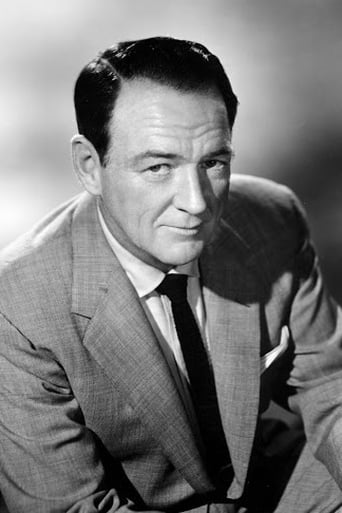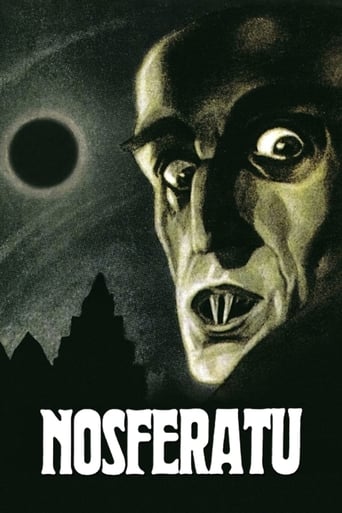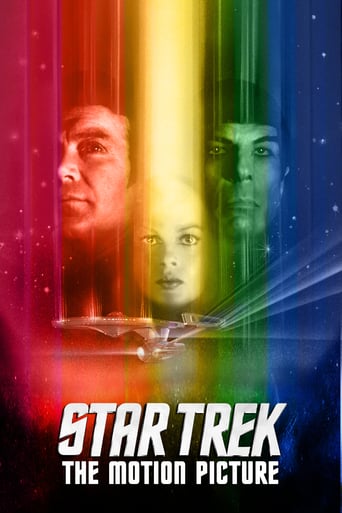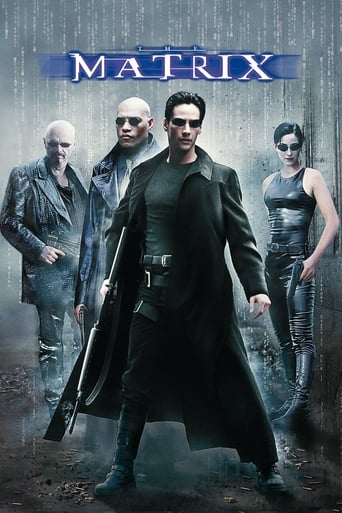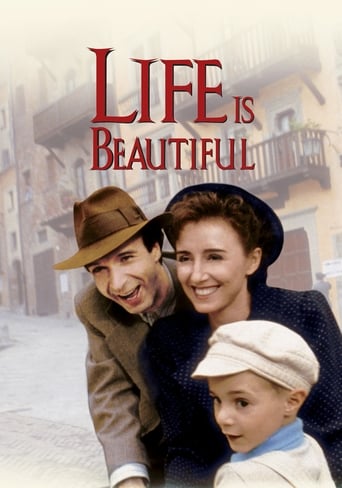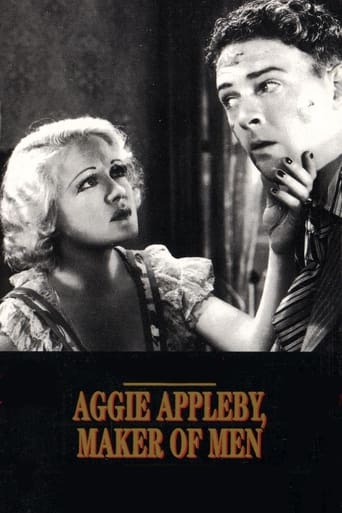
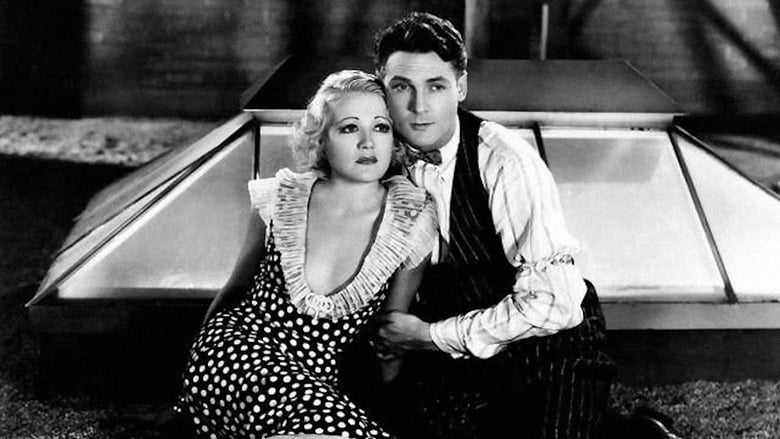
Aggie Appleby, Maker of Men (1933)
Tough Aggie gives a street guy polish and a rich kid gumption.
Watch Trailer
Cast
Similar titles
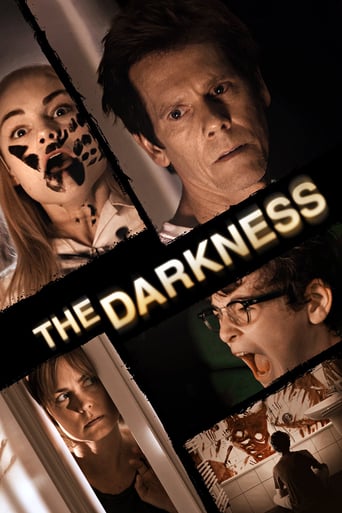

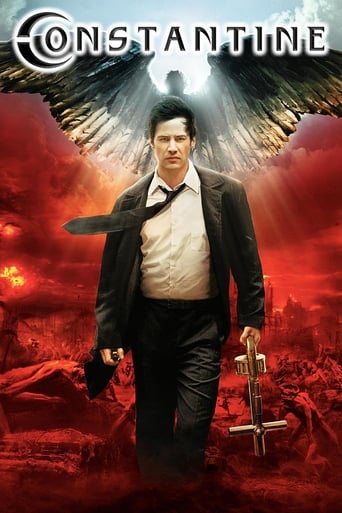
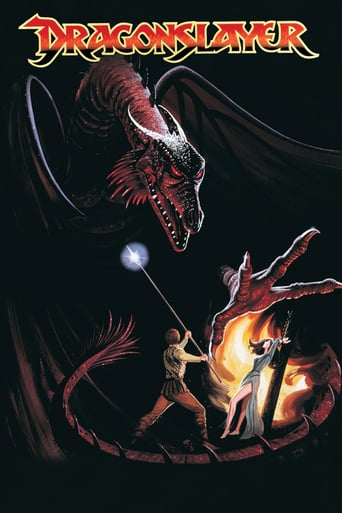
Reviews
Why so much hype?
I like movies that are aware of what they are selling... without [any] greater aspirations than to make people laugh and that's it.
Tells a fascinating and unsettling true story, and does so well, without pretending to have all the answers.
The story, direction, characters, and writing/dialogue is akin to taking a tranquilizer shot to the neck, but everything else was so well done.
Delightful intelligent romantic comedy. Wynne Gibson stars as the title character Aggie Appleby. Aggie marries a roughneck named Red Branahan (William Gargan). After Red is sent to prison, Aggie is left homeless and, through a comical turn of events, winds up sharing the apartment of meek wimp Adoniram Schlump (Charles Farrell). She begins to help Schlump turn his personality around, gain some confidence, and even find a job using her husband's name and reputation. But this is just the start of the story as the two fall in love right as her husband gets out of prison.This is an undiscovered gem. A Depression-era comedy that's smart and fun, with snappy dialogue and endearing performances by all. Wynne Gibson is exceptional and I'm surprised she didn't go on to better things. My only complaint is I was hoping for a different ending but got something predictable. This time the production code can't be blamed either. Still, it's not enough to detract from an excellent film.
The tough Wynne Gibson is the live-in girlfriend of brutish William Gargan who goes to prison for beating up cops in a riot at the restaurant where Gibson works. Now fired, she is kicked out of her room by landlady Jane Darwell. Pal Zasu Pitts, a maid, allows Gibson to sleep in one of the rooms where she works while its tenant, Charles Farrell, is out. Gibson, sort of a modern day Snow White (who obviously drifted), is sound asleep when Farrell comes in, and feeling sorry for her, Farrell allows her to stay. In return, she decides to help him find a job by becoming tougher. But when Gargan gets out of prison, the two are in for trouble! This is the prototype for what made movies so fun before Will Hays came in with his scissors, filled with innuendos throughout and so many witty lines. The script basically burlesques the tough dialog of depression era New York, and Gibson goes to town with lines like "Life begins and ends in the bed. And then some." and "Quit talking like a lollipop. Put some words with hair on them." Even the hand-wringing Pitts gets into the act, quipping with "I figure men are like trees. The more you tap them, the faster the sap comes out." Pitts sums up Gibson's situation with "You may think you're in love with two men, but one of them is just indigestion." Gibson, who stole her brief scene in the all-star "If I Had a Million" as an obvious prostitute who chooses to take her millions, rent a darkened hotel room, and sleep alone, has a presence of nobody else from this era, although it is obvious that she was modeled on Mae West. Farrell, free from those sunny Janet Gaynor musicals at Fox, gets to explore two sides of his character, and Pitts makes the most of every moment she is on screen as well.The opening credits of the elevated train going through the lower east side of Manhattan are a visual treasure. You won't run into Leo Gorcey or Huntz Hall in this part of the Bowery!
A brawling roughneck and a timid wimp are both whipped into shape by AGGIE APPLEBY MAKER OF MEN.This refreshingly forthright & honest look at a Depression-era New York City female and her two problem men is a delight from start to finish. Elements both comic and tender are blended together into a very satisfying package which, whatever the situation, rings true every time. Wynne Gibson gives a remarkably unaffected performance--bold, brassy, bossy, but also unfailingly decent & loving. She doesn't waste time with either regrets or excuses, but gets on with her tough life, helping others whenever she can.Charles Farrell, a major box office star in the early 1930's, is excellent as the diffident young fellow who changes his entire persona, thanks to Miss Gibson's efforts. Farrell lets us see how vulnerable his character still is, even after assuming his new attitude. The short scene in which he is attacked by a bully is actually painful to watch. William Gargan epitomizes the kind of loudmouthed bruiser who's actually a softy when it comes to his girl.Wispy & almost ethereal, the enormously talented ZaSu Pitts plays the cleaning lady friend of Miss Gibson. Future consumer advocate Betty Furness portrays Farrell's surprisingly liberated hometown girlfriend, while Blanche Frederici appears as his rather frightful aunt.Movie mavens will recognize an unbilled Jane Darwell as Miss Gibson's practical landlady.
The Depression era comes alive in this film about a waitress (Wynne Gibson) who falls in love with a street-fighting hoodlum, Red Branagan (William Gargan). When Branagan goes to prison for beating up some cops, Aggie is left broke and on her own, eventually meeting Adoniram Schlump (Charles Farrell), a rich sissy from Upstate trying to make it in the big city. Under Aggie's tutelage, Schlump takes on Branagan's identity and his combativeness. Then the real Branagan gets out of prison....Gibson and Gargan are particularly good as a couple of tough New Yorkers struggling to make ends meet, and Farrell (reminiscent here of Harold Lloyd, whom he slightly resembled) comes alive as a neurotic rich boy who finds success as a brawler. The film's use of slang is especially entertaining -- dated, but colorful. (Aggie tells Schlump: "Stop talking like a lollipop. Use some words with hair on them.")Can't help wondering whether the film's clever title would have been possible a year or two later, with the coming of the Production Code.
